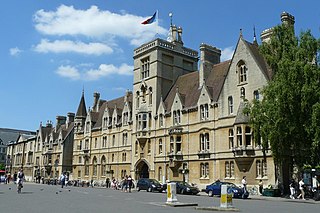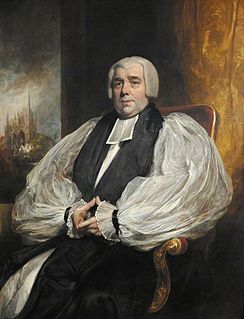
John Balliol, known derisively as Toom Tabard, was King of Scots from 1292 to 1296. Little is known of his early life. After the death of Margaret, Maid of Norway, Scotland entered an interregnum during which several competitors for the Crown of Scotland put forward claims. Balliol was chosen from among them as the new King of Scotland by a group of selected noblemen headed by King Edward I of England.

Balliol College is one of the constituent colleges of the University of Oxford in England. One of Oxford's oldest colleges, it was founded around 1263 by John I de Balliol, a rich landowner from Barnard Castle in County Durham, who provided the foundation and endowment for the college. When de Balliol died in 1269 his widow, Dervorguilla, a woman whose wealth far exceeded that of her husband, continued his work in setting up the college, providing a further endowment, and writing the statutes. She is considered a co‑founder of the college.

Trinity College is one of the constituent colleges of the University of Oxford in England. The college was founded in 1555 by Sir Thomas Pope, on land previously occupied by Durham College, home to Benedictine monks from Durham Cathedral.

Benjamin Jowett was renowned as an influential tutor and administrative reformer in the University of Oxford, a theologian and translator of Plato and Thucydides. He was Master of Balliol College, Oxford.

The House of Balliol was a noble family originating from the village of Bailleul in Picardy. They held estates in England, granted during the reign of King William Rufus. Through marriage, they had claims to the Throne of Scotland. One member of the family, John Balliol, was named King of Scotland after the disputed succession following extinction of the Dunkeld line. John was deposed, leading to the First War of Scottish Independence. His son, Edward Balliol, also briefly controlled the Scottish throne during the Second War of Scottish Independence. Edward had no issue, and the direct line went extinct with him.

John de Balliol was a leading figure of Scottish and Anglo-Norman life, belonging to the House of Balliol. Balliol College, in Oxford, is named after him.
The Oxford University Mountaineering Club (OUMC) was founded in 1909 by Arnold Lunn, then a Balliol undergraduate; he did not earn a degree.
Robert Scott was a British academic philologist and Church of England priest.
Andrew Graham is a political economist. He is currently Executive Chair of the Europaeum and Chair of the Academic Council of the Europaeum, Senior Fellow of the Oxford Internet Institute, Trustee of Reprieve, and an Honorary Fellow of Balliol College, Oxford and of St Edmund Hall,Oxford.
George Cotes was an English academic and a Catholic bishop during the English Reformation.
The Snell Exhibition is an annual scholarship awarded to students of the University of Glasgow to allow them to undertake postgraduate study at Balliol College, Oxford. The award was founded by the bequest of Sir John Snell in a will made in 1677, although the original stipulation referred to the University of Oxford, rather than Balliol in particular. Snell died on 6 August 1679, but wrangling over the will meant that it was nearly twenty years before the first scholarships were awarded; the first four Snell Exhibitioners were admitted to Balliol in mid-1699.

Buittle is an ecclesiastical and civil parish in Dumfries and Galloway, southwest Scotland, in the traditional county of Kirkcudbrightshire. It lies to the west of the Urr Water, between Dalbeattie and Castle Douglas, and extends from Haugh of Urr in the north to Almorness Point on the Solway Firth in the south. The main settlement is the small village of Palnackie.
Alexander Dunlop Lindsay, 1st Baron Lindsay of Birker, known as Sandie Lindsay, was a Scottish academic and peer.

Balliol College Boat Club (BCBC) is the rowing club for members of Balliol College, Oxford, England. It is one of the college boat clubs at the University of Oxford.
Thomas Good was an English academic and clergyman, and Master of Balliol College, Oxford. He is known as a moderate in and orthodox apologist for the Church of England, engaging with Richard Baxter and urging him to clarify a 'middle way'.

John Parsons was an English churchman and academic, Master of Balliol College, Oxford from 1798, and Bishop of Peterborough from 1813.

Arthur Lionel Smith was a British historian at the University of Oxford. Smith served as Master of Balliol College, Oxford from 1916 to 1924.
Richard Jenkyns was a British academic administrator at the University of Oxford and Dean at Wells Cathedral.
Robert Thwaits was an English medieval academic administrator.
Antony Garnet was an English academic during the 16th-century: he graduated B.A. from Balliol College, Oxford in 1547 and M.A. in 1551; and was Master of Balliol from 1560 to 1563.










